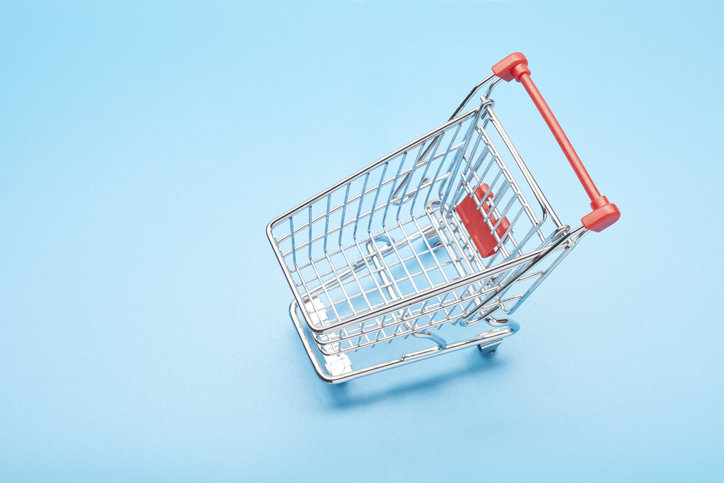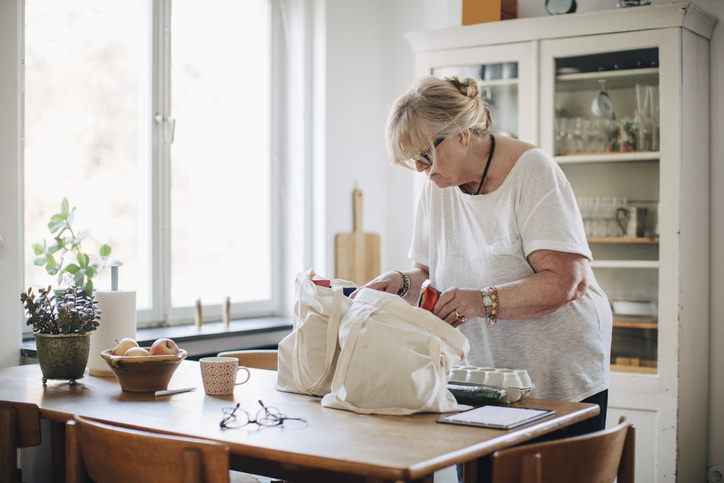8 Tips For Safe Grocery Shopping Amongst COVID-19

I feel incredibly grateful that I get to quarantine safely at home. The coronavirus pandemic is now at more than 920,000 cases globally and more than 46,000 deaths. In the United States, there are more than 210,000 cases and more than 4,600 deaths. And, unfortunately, these numbers are expected to rise.
I’m also very appreciative of doctors, nurses and other hospital staff. They are putting their own lives at risk, working around the clock with infected people and, furthermore, not always with the proper protective gear. (This is a major reason why it is on us to be proactive about our health and avoid the underlying conditions that greatly increase the risk of developing complications or even dying from this virus).
And then there are those who work in grocery stores. In my opinion, they too deserve some major recognition. Grocery stores are not exactly the safest places to be right now, because items are handled and people are constantly coming in and out of the stores.
Recently, a Culver City (in Los Angeles County) Costco employee tested positive for COVID-19. And we are seeing multiple similar stories about grocery store workers in other parts of Southern California and across the United States. For example, this report says a Whole Foods employee in Chicago recently tested positive for the virus.

Of course, I cannot definitively say that these workers all contracted the virus at their place of employment, however, we are seeing a trend of people working in grocery stores getting COVID-19. And just like the people working in hospitals, they do not always have access to protective gear.
So, how do we help protect ourselves as shoppers when we go to the grocery store?
We have to eat and buy groceries. There is no getting around that. But if we can protect ourselves, we may be able to protect others by not contracting COVID-19 and avoid passing it to other people and not continue to overwhelm the incredibly stressed healthcare system right now.
I recently discussed how to shop healthily during this pandemic, but let’s discuss how to shop safely.
- Keep your distance.
Although this virus can be transmitted through touching a contaminated surface such as a door knob or countertop, the main vehicle of transmission is believed to be from person-to-person contact. This is why stay at home orders and practicing social distancing are so crucial.
It can be challenging to maintain good social distancing skills while grocery shopping, but do your absolute best to keep at least six feet from other people. If a section of the grocery store looks particularly crowded, come back to that section later. If we all make a collective effort to be respectful of one another’s space, we can help prevent the spread of this virus.
- Shop solo.
It’s common for parents to grocery shop with their kids or perhaps for a person to shop with their spouse so that they can tackle the stress of grocery shopping together. But the more people, the more chances there are to become infected or pass the virus on to someone else. If possible, go grocery shopping alone and be the designated grocery shopper for your household. However, if you are feeling sick, I cannot stress enough how important it is for you to stay out of the grocery store and stay at home.
- Stake out stores that are enforcing social distancing.
Look up stores in your area and call ahead to see if they are regulating the number of people allowed in the store at once. If you are elderly (which puts you in the more vulnerable population due to having a compromised immune system), see if your local store offers senior hours. This may also be available to people with underlying health conditions. You can learn more about this here.
- Wipe it down.
Most grocery stores are providing antibacterial wipes to clean off grocery cart handles. I would suggest cleaning the cart and wiping your hands down. In general, try to touch as few things as possible. This is not the time to “explore” in the store. Go in with a plan, knowing what you want to get and get out. When checking out, I recommend using a clean tissue to touch the keypad for payment. Dispose of this tissue immediately.
- Make a paper list.
Most of us depend on our phones for the convenience of it. It’s much easier and efficient to make your grocery store list on your phone as opposed to using a piece of paper that you may lose or forget.
But according to Dr. Lauren Sauer, an assistant professor of emergency medicine at Johns Hopkins University School of Medicine, who was referenced in this TIME article, you should make a paper list because you can throw it away and it reduces the risk of virus particles being transferred to your phone.
“The less you can touch your personal items in public spaces, the better,” she said.
So try to avoid texting, checking emails and taking calls in the grocery store. Again, your mission is to get in and get out!
- To wear a mask or not?
There are varying opinions on whether people who do not seem to be sick or are not vulnerable should wear masks or a bandana or scarf over their mouth and nose while in public. Some say that it gives people a false sense of protection and makes them less likely to abide by the six feet rule. The Centers for Disease Control and Prevention (CDC) is currently reviewing what they believe should be proper mask use.
If you are sick or caring for someone sick, a mask is definitely recommended (and, of course, if you are sick, you should not be in the grocery store).
A potential issue with masks is that people do not necessarily put them on and remove them properly. In order to lessen the likelihood of infection, always wash your hands before putting a mask on as well as removing it.
If you wear a cloth, non-disposable mask that you plan to wear again, wash in hot water as soon as you get home from the grocery store.
- Clean reusable bags.
Do this every time you come back from the grocery store. If you can, machine wash them. It is also a good idea to change out of the clothes you wore to the store and throw them into the wash. Some people even go as far as taking a shower and washing their hair when they get back from the store.
- Wash your hands.
As simple as this is, it cannot be said enough. Wash your hands as soon as you get back from the grocery store. Wash your produce before you put it away, and wipe your kitchen counters down after you are done putting groceries away.
There are different views on whether you should disinfect items such as milk cartons and other packaging. I think it definitely doesn’t hurt to wipe them down.
"It's probably a little overkill, but there are viral fomites — surfaces where the virus can live — and the virus especially seems to like plastics and metal. So I think it's important for plastic containers that have been handled at the supermarket by other people to get wiped down before they get put in your house," said one doctor in this report.
Finally, if you have the ability to do so, stick to online grocery shopping as much as possible. The less you can step foot in the grocery store, the better. If this is not available to you, make sure that when you go to the store you buy enough to last you a few weeks. This does not mean that you should panic shop and hoard.
Let’s work together and beat this pandemic.
Enjoy your healthy life!
The pH professional health care team includes recognized experts from a variety of health care and related disciplines, including physicians, attorneys, nutritionists, nurses and certified fitness instructors. This team also includes the members of the pH Medical Advisory Board, which constantly monitors all pH programs, products and services. To learn more about the pH Medical Advisory Board, click here.







